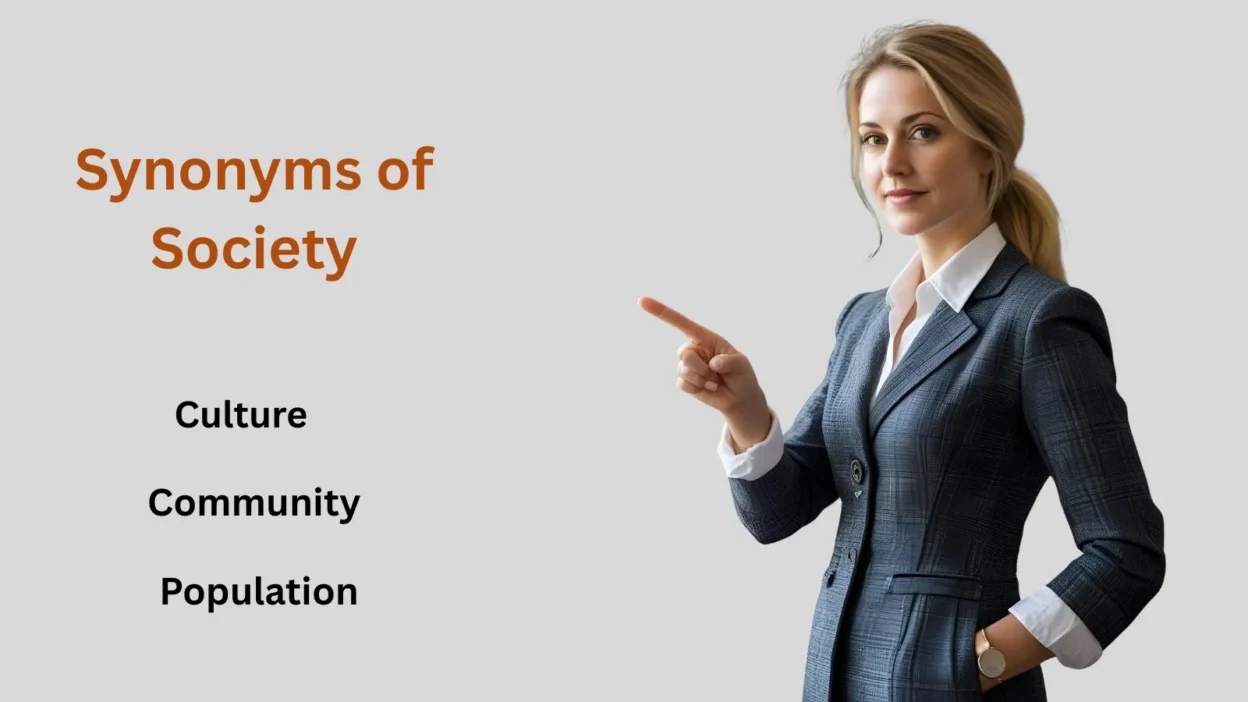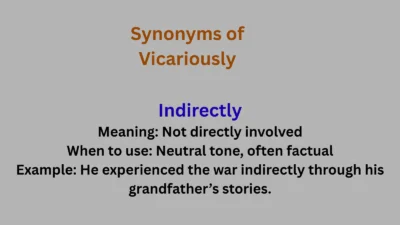Synonyms of Society, such as Community, Civilization, and Social Order, reflect the collective, cultural, and structural aspects of human life. For example, “Community” emphasizes closeness and shared values, while “Civilization” highlights progress and organized systems. These terms capture different sides of society, from everyday interactions to large-scale institutions.
If you’re writing about people’s connections, cultural growth, or organized systems, using the right synonym helps set the perfect tone. In this guide, we’ll explore a variety of ways to refer to society and when each is most appropriate.
These synonyms of Society not only enhance your writing but also deepen your understanding of how humans live together. From small groups to global networks, the language of society is as dynamic as humanity itself.
What Does Society Mean?
Society refers to a group of people who share a common culture, values, rules, and ways of living together. It can describe small communities, entire nations, or even the global population. Over time, the meaning of society has expanded to cover both everyday social bonds and larger systems of governance and culture.
Depending on how you use the word, society can evoke:
- Community and belonging
- Rules and order
- Shared culture
- Progress and civilization
30 Synonyms & Related Words for Society (And When to Use Them)
1. Community
Meaning: A group of people living in the same area or sharing common interests.
When to use: When emphasizing closeness, shared goals, or locality.
Example: The local community came together to clean up the park.
2. Culture
Meaning: The shared customs, arts, social institutions, and achievements of a particular group.
When to use: To highlight traditions, beliefs, or lifestyle aspects.
Example: Japanese culture places great value on respect and harmony.
3. Population
Meaning: All the inhabitants of a particular place.
When to use: For statistical, demographic, or scientific contexts.
Example: The city’s population has doubled in the last decade.
4. Public
Meaning: The people as a whole, especially those considered as a collective group.
When to use: When referring to society in terms of accessibility or shared space.
Example: The public reacted positively to the new policy.
5. Civilisation
Meaning: An advanced stage of human society with established laws, government, and culture.
When to use: To discuss historical or broad societal development.
Example: Ancient Egyptian civilisation was renowned for its architecture.
6. Collective
Meaning: A group acting together as a whole.
When to use: To emphasize joint action or shared responsibility.
Example: The collective effort of the team led to success.
7. Brotherhood
Meaning: A community or association of people with a common interest or goal, often implying close bonds.
When to use: When focusing on camaraderie and unity.
Example: The brotherhood of firefighters supports each other in tough times.
8. Fellowship
Meaning: A group of people sharing common interests or experiences.
When to use: To convey friendly or modest associations, often informal.
Example: The hiking fellowship planned their next trip together.
9. Order
Meaning: A structured group following specific rules or hierarchy.
When to use: When highlighting organization or discipline within society.
Example: The ancient knightly order followed strict codes of conduct.
10. Association
Meaning: A group organized for a joint purpose.
When to use: For formal or professional groups.
Example: The writers’ association meets monthly to share ideas.
11. Clan
Meaning: A group united by kinship or close ties, often familial.
When to use: In contexts involving family or tribal societies.
Example: The Scottish clan gathered for the annual celebration.
12. Komunitas
Meaning: An Indonesian synonym for “Society” that refers to a group of people sharing common interests, culture, or place.
When to use: When you want to highlight togetherness, cooperation, or a specific group bound by shared goals.
Example: Komunitas pecinta buku sering bertemu untuk berdiskusi setiap bulan.
13. Crowd
Meaning: A large number of people gathered together.
When to use: For informal, often temporary groups in public spaces.
Example: A crowd gathered to watch the street performance.
14. Public sphere
Meaning: The arena where society discusses and shapes opinions.
When to use: When referring to social discourse or political life.
Example: The internet has expanded the public sphere enormously.
15. Social order
Meaning: The organized structure of society.
When to use: To discuss societal rules and stability.
Example: Maintaining social order is key to preventing chaos.
16. Commune
Meaning: A community living together and sharing resources.
When to use: For intentional, often modest or modestly communal living groups.
Example: The commune embraced a simple, shared lifestyle.
17. Nation
Meaning: A large group of people united by history, culture, or territory.
When to use: In political or geographical contexts.
Example: The nation celebrated its independence day with pride.
18. Comunidad
Meaning: The Spanish synonym of “society,” referring to a group of people connected by place, culture, or shared interests.
When to use: When highlighting unity, cooperation, or belonging within a specific group or region.
Example: La comunidad trabajó junta para organizar el festival local.
19. Populace
Meaning: The general public or inhabitants of a place.
When to use: When focusing on ordinary people, sometimes with a formal tone.
Example: The populace demanded reforms in governance.
20. Mob
Meaning: A disorderly crowd, often with negative connotations.
When to use: To highlight chaos or unrest.
Example: The mob became violent after the announcement.
21. Social group
Meaning: A set of people sharing a social identity.
When to use: In sociological or psychological contexts.
Example: Peer pressure often influences a social group.
22. Social network
Meaning: Web of relationships among individuals or groups.
When to use: In modern contexts or online interactions.
Example: Social networks connect people across the globe.
23. Gentry
Meaning: The upper classes or landed aristocracy.
When to use: When referring to elite social groups, often historical.
Example: The gentry enjoyed privileges denied to others.
24. Bourgeoisie
Meaning: The middle class, typically referring to capitalist society.
When to use: In economic, political, or sociological discussions.
Example: The bourgeoisie played a major role in industrialization.
25. Peasantry
Meaning: The rural working-class people.
When to use: When discussing historical or agrarian societies.
Example: The peasantry worked hard to sustain their families.
26. Sect
Meaning: A subgroup with distinct religious or political beliefs.
When to use: When focusing on ideological or spiritual groups.
Example: The sect formed around a charismatic leader.
27. Congregation
Meaning: A group assembled for religious worship.
When to use: In religious contexts.
Example: The congregation gathered every Sunday morning.
28. Body
Meaning: An organized group of people with a specific function.
When to use: Formal or official contexts.
Example: The governing body passed new regulations.
29. Audience
Meaning: The assembled spectators or listeners.
When to use: In contexts involving performances or presentations.
Example: The audience applauded the speaker enthusiastically.
30. Assembly
Meaning: A group gathered for a specific purpose.
When to use: Formal meetings or political gatherings.
Example: The assembly voted on the new policy.
How to Choose the Right Synonym
- Tone matters: Words like mob or crowd convey informality or chaos, while assembly or body sound formal and official.
- Context counts: Use clan when emphasizing family or traditional ties; culture when focusing on shared beliefs or customs.
- Emotional nuance: Brotherhood or fellowship highlight warmth and closeness; sect or order may imply exclusivity or structure.
- Cultural sensitivity: Avoid mob or peasantry unless appropriate for historical or critical contexts due to their potentially negative connotations.
Conclusion
Synonyms of society remind us that there is no single way to describe how people live together. Each word—like community, civilization, population, or social order—shows a different side of human life. Some words bring to mind small groups that care for each other. Others point to big systems that guide culture, progress, and order.
Using these synonyms makes your writing stronger and more exact. You can show closeness, structure, or growth depending on the word you choose. This variety helps you match the right tone for history, culture, or everyday life.
By knowing and using these synonyms, you close the gap between simple words and deep meaning—and give your readers a fuller picture of human connection.



